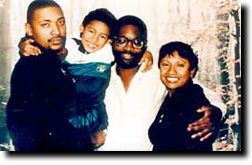 |
|
 |
|
|
John Henry Griffin #03848-041 |
 John with his family |
30 Years, Heroin Conspiracy I was born in 1950 in St. Paul, Minnesota to a blue-collar African-American family. My early home life consisted of the normal socializing processes, the inculcation of American social norms, and I developed like any other normal American boy ... until I started school.
In grade school, I found it hard to concentrate on studies of my classes that bore no relationship to my life or culture. I felt that teachers were openly hostile, and they did not invite inquisitiveness. Repeatedly, I had problems learning subjects that contradicted my knowledge of how life was in my world and my culture.
Instead of seeking the cause of my difficulties, counselors steered me toward the industrial arts classes, commonly called "shop," where I could prepare for life as a menial drone. No one asked what the hopes and dreams of John Griffin were. The social attitudes of America in the 1950s and 1960s had already determined that black men didn't need college to use their backs and hands.
I soon learned that there were two Americas: One for white people and one for black people. This realization was directly in contrast to what was taught in school: the Constitution - "one nation under God" and "all men being created equal." My hopes of the American Dream were shattered.
I skipped school and spent my time with other disillusioned black youth. It was easy to notice that on the streets of my community, the prosperous people were those who hustled and pimped. They commanded a respect as well, for it was these same people that helped the poor to feed their children.
Normal ways to achieve success were closed to me. I chose the life of a hustler. Psychologist, Abraham Maslow argued that human beings have a hierarchy of need that must be met to sustain life and that we will strive (no matter what) to fill those basic needs. Self-actualization is another word for seeing oneself as successful - as defined by the ideals of success accepted in the society in which an individual is socialized. We are socialized in America, for this is where we live - black or white. I, like so many other black youth, chose hustling so I could be successful.
Afraid to lead a "hand to mouth" existence, I tried to return to school. A counselor dismissed me by saying, "You are not college material. You should take up sheet metal shop and become a sheet metal worker." An English teacher was more explicit when, in front of the class he told me, "Why don't you just apply for welfare now and get it over with."
At 16 I was a father, drug-dependent and had already been arrested for burglary. The mother of my daughter was forced to apply for welfare and I snuck in and out of their home because welfare rules forbid me to live there while she was on public assistance. My self worth and dignity were gone, and heroin and cocaine became my drugs of choice.
At the age of 19, I was arrested and convicted of simple robbery and forgery - both felonies. I was sentenced to 18 months and sent to St. Cloud's Reformatory. There was no rehabilitation or "reform" there - no counseling nor education. I was introduced to the dirty floors and windows and handed a mop and rags. When I left St. Cloud's, it was with $50 and a set of cheap clothes, and I returned to hustling.
I was arrested five more times and spent more than 9 years away from my wife and children before I was sentenced to 30 years in prison for possessing a users' amount of drugs.
I tell my story in order to convey that my situation is not unique. This exact story is being played out all across America as I write. Young black men are being fed into the "justice system" by the thousands every single day. Nothing has changed over time, except the ration of stigmatized African-American males. When I first went to prison in 1968, black men represented one quarter of our nation's prison population. Now, however, African-American males comprise as much as 65 percent in many prison populations. Keep in mind that black males represent only 6 percent of the total male population in the United States, yet almost seven out of every ten prisoners are black.I was arrested with just two grams of heroin - a drug I was addicted to. The normal sentence range for possession of such an amount is 3 to 4 years. I was only a customer and they included me in the conspiracy. No one testified against me. There were no sales or marked money. But I went to trial and lost.
I was a user of heroin and cocaine, and 30 years on a man in his forties is akin to capital punishment. I'm fifty now and have high blood pressure and high cholesterol. It is ludicrous to hand down a 30-year sentence for drug dependence. Why would a system of justice do that?
John Henry Griffin 03848-041
PO Box 1000
Oxford, WI 53952Updated - 1/03/01
Back to the Wall
|
|
|